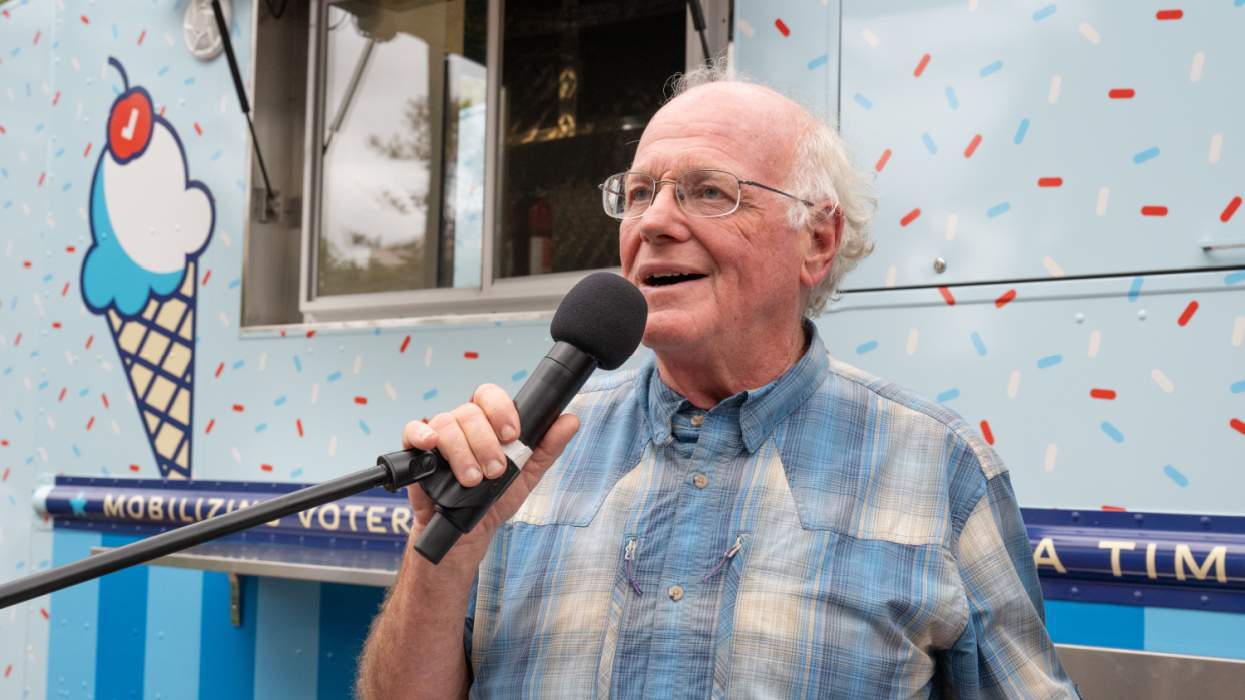Today, California state Senator Scott Wiener (chair of the Senate LGBTQ caucus) and assemblymember Shirley Weber (chair of the Senate Black Caucus) are asking Governor Newsom to posthumously pardon gay activist and organizer Bayard Rustin.
Sixty-seven years ago to the day, on January 21, 1953, Rustin was arrested after he was discovered having sex with two men in a parked car -- just hours after giving a speech while visiting Pasadena, Calif., as part of a lecture tour on anti-colonial struggles in West Africa.
After serving 50 days in Los Angeles Country jail, the out organizer and public speaker was charged for vagrancy (a common charge against LGBTQ people engaging in consensual sex at the time) and forced to register as a sex offender. The conviction, as was the case for many gay and bisexual men in that period, haunted Rustin for the rest of his life until he died in 1987.
A close confidante to Martin Luther King, Jr., Rustin was one of the key organizers of the 1963 March on Washington for Jobs and Freedom, and played a vital role in various nonviolent movements, boycotts, and protests to end racial discrimination.
Watch a part of his speech at the March on Washington below:
"Gov. Newsom pardoning Bayard Rustin will send a profound and powerful message that California is moving away from our ugly past in terms of how we treat LGBTQ people," Sen. Wiener, who co-sponsored 2017's HIV decriminalization law, SB 239, tells The Advocate.
As an activist, Rustin was jailed several times for violating racist segregation laws. At one point, he was badly beaten for refusing to move from a "whites only" section of a bus.
Rustin's LGBTQ activism came later in life and he never shied away from discussing his own identity as a gay man. Despite the fact that he was out in his personal life, the arrest in Pasadena placed an uncomfortable spotlight on him.
As Rustin once said in an interview conducted by Redvers Jeanmarie in March 1987:
"It is difficult for me to know what Dr. King felt about gayness except to say that I'm sure he would have been sympathetic and would not have had the prejudicial view. Otherwise he would not have hired me. He never felt it necessary to discuss that with me," Rustin explained, as excerpt from the book From Time on Two Crosses: The Collected Writings of Bayard Rustin. "He was under such extraordinary pressure about his own sex life. J. Edgar Hoover was spreading stories, and there were very real efforts to entrap him. I think at a given point he had to reach a decision. My being gay was not a problem for Dr. King but a problem for the movement."
After his conviction, the activist's religious allies removed him from the Fellowship of Reconciliation, an interfaith peace organization where Rustin was secretary for student and general affairs.
Then, in an effort to discredit the Civil Rights movement overall, Senator Storm Thurmond of South Carolina read Rustin's entire arrest file into the Congressional record, which resulted in several civil rights leaders distancing themselves from Rustin publicly -- despite the fact that he played an integral role in the movement's success.
Rustin was ultimately sidelined from the Civil Rights movement, but became an unsung hero for many decades among queer people of color. His contributions have never been forgotten.
"I think this is a pretty clear cut case of severe injustice," Sen. Wiener says. "Bayard Rustin did not hurt anyone. He was simply criminalized, like countless other of gay men have been criminalized, for having sex. Countless of LGBTQ people have been criminalized in general. The history of the LGBTQ community has been a history of criminalization. It's society's efforts to eliminate us."
Wiener adds that he hopes by pardoning Rustin, young LGBTQ people will be encouraged to learn more about his life and the man he was.
"A lot of people know who [Rustin] was, and a lot of people don't. We need to make sure that people know. We also need to remind young LGBTQ people it wasn't that long ago that it was illegal for us to have sex," says Sen. Wiener, referring to 2013's landmark Supreme Court decision, Lawrence v. Texas, which decriminalized consensual same-sex relations between adults. "Police were harassing us, shutting down bars, not letting us gather, arresting us for having consensual sex. Though nieither are challenges [today], it wasn't 30, 40, 50 years ago. And around the world today, LGBTQ people are being horribly persecuted."
Though Wiener is confident that Newsom will support Rustin's pardon, which also has support from Los Angeles County District Attorney Jackie Laceyhe, he is fully aware that the fight against stigma and discrimination in California is far from over.
"I feel a solemn responsibility to fight for my community as a gay man," explains Wiener, who represents San Francisco and parts of San Mateo County. "I have a responsibility to wake up every day and fight for my community. Of course, it's not the only work I do. I work for all communities. We have amazing allies in the legislature, but ultimately our community needs to be at the table and we need to stick up for ourselves."
"One of my priorities every year is trying to keep pushing California to be the beacon of equality and justice for LGBTQ people that we must be," he adds. "We've been working really hard in California to decriminalize our community. We've passed legislation to decriminalize HIV and we're working as we speak to try to end discrimination against LGBTQ people on the sex offender registry."
As far as making the long-overdue pardon a reality, Wiener simply says, "It's up to Governor Newsom."















Charlie Kirk DID say stoning gay people was the 'perfect law' — and these other heinous quotes
These are some of his worst comments about LGBTQ+ people made by Charlie Kirk.